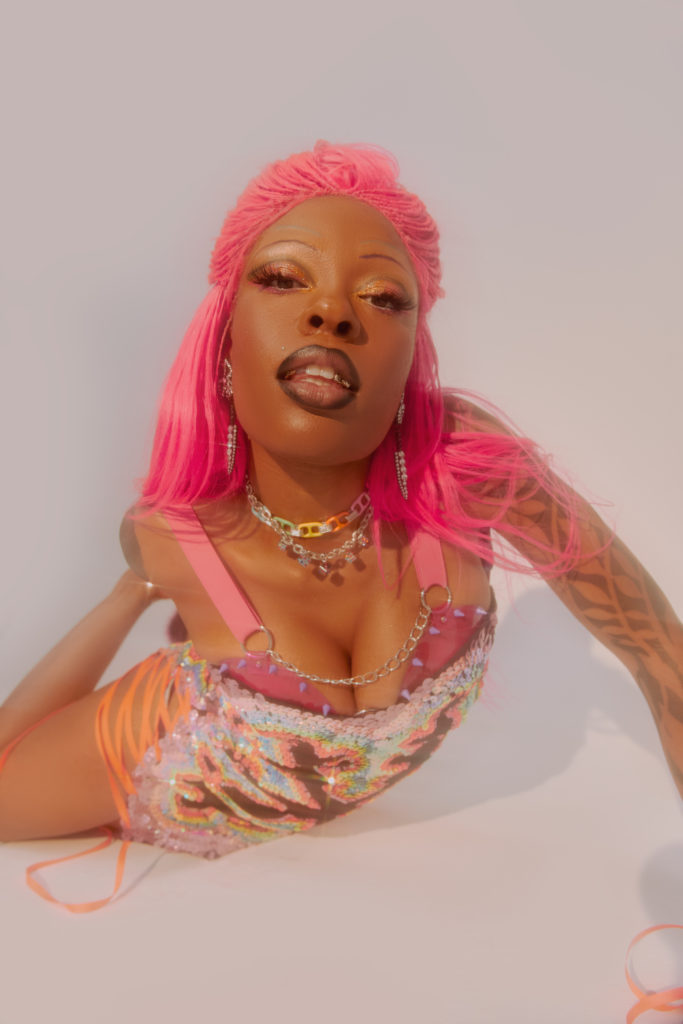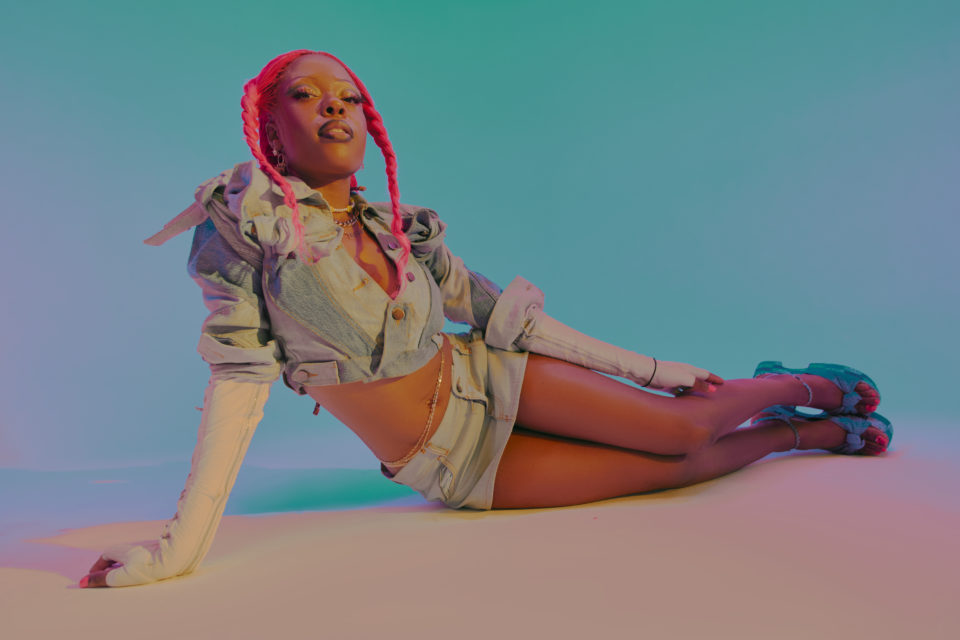Brittney Parks’ first attempt at professional music-making was a duo with her twin sister called N2. It wasn’t their idea, but the brainchild of their musically successful step-father, which was part of why the project didn’t work out. “He didn’t want me to be involved in the production, but I wanted to be a producer more than anything,” Parks explains. So you could call Natural Black Prom Queen, Parks’ second full-length as Sudan Archives, kind of a spite record, aimed at a pushy, know-it-all, stepdad. On these recordings, she’s a producer first and foremost, and her approach to production is what makes the album shine.
“I like to f*** with violin sounds and make it sound weird,” Parks tells me over the phone. Two years ago, she bought a bunch of guitar pedals and started experimenting with the sounds she got from her instrument, pushing them through the gear and twisting the knobs to create textures that don’t sound like a violin at all: “Like, on ‘Homesick’ it sounds like a guitar, but it’s a violin.” Park’s experimentation on this album fleshes out her own version of Afrofuturism, even as she looks carefully to carry tradition into the future.
After leaving N2 and before being signed as Sudan Archives, Parks was on track to study ethnomusicology, a field that serves as inspiration for the name Sudan Archives itself. And though she never got to study it in a university, she puts the study into practice on this album. The song “Copycat” features production from a Stone Age African violin called the goje. “I have a bunch of African instruments in my basement,” she says. “I know where they are from and all about them. I feel like incorporating them into my music is helping to stop the dying of a traditional sound.”
Central to the album is Parks’ hometown of Cincinnati. As her parents moved up in their careers, they moved on up and around the Cincinnati suburbs, causing the Parks sisters to switch high schools multiple times in four years. “I didn’t feel connected to anybody,” she says of her high school experience. During graduation, “People were crying and saying ‘I’m going to miss you,’ and I was just thinking, ‘I don’t know none of you.” She never went to prom, and Natural Black Prom Queen is a hypothetical look at what prom would be like if she went back today—now that she is more confident, has a lot to say, and is one hell of a producer.

On the Record: A Q&A with Sudan Archives
Sudan Archives: I’m good. I’m about to have a fiddle lesson in about in less than an hour.
Justin Barney: Do you do lessons often?
SA: No, I never had lessons. I just started a couple months ago.
JB: What a time to start, after you’ve been a very successful musician. Why did you start?
SA: Because I’ve always wanted lessons. I just couldn’t afford it. So now I feel like I deserve it.
JB: Who’s your teacher?
SA: Michael Kelly. He’s specifically a fiddle teacher. He specializes in fiddle music.
JB: How did you find him?
SA: Facebook violin nerd groupchat collective. It’s a Facebook group where we just talk about fiddles.
JB: You had started your musical career with your twin sister. I am also a twin, so I feel the twin connection. And your stepdad was a successful musician and producer in the music industry. He tried to get you to be a pop duo. First off, what was the name of this pop duo?
SA: I think it was called like the letter N and the number two. N2.
JB: Why that?
SA: Honestly, I just can’t remember why we call it that.
JB: Why didn’t that group work for you?
SA: Because at the time, I just wanted to go out late at night to experimental shows and party. That’s what it seemed like to them, but I wanted to study, to see what the electronic music scene was really doing. It was really interesting to me. So I just always wanted to go out. And [my stepdad] didn’t really want me to be involved in the production of what we do because he just felt like you let the producers focus on that. But I guess, at the time I didn’t really know how to explain it, but I really wanted to be a producer, more so than a singer or anything.
JB: I felt like that is a big part of the album. You’re so involved in the production. And I feel like you are exercising your artistic agency as a producer.
SA: Yeah, because I was producing and executive producing and not just making things by myself from beginning to end, but also putting in a bunch of different parts together and figuring out the way I want it to be arranged.
JB: So N2 disbanded. What does your twin sister do? Did she pursue music as well?
SA: No, she’s a yoga teacher now.
JB: Why did you think that she did not pursue music?
SA: I think that she wanted to take a break from it, because she had a spiritual awakening and she really felt like she needs support for herself and a nonprofit that she started helping women.
JB: And why do you think that you stuck with it?
SA: I feel like I’ve always felt like that was my way of expressing myself, through sound.
JB: And you followed that into college, going to Pasadena State College and studying ethnomusicology…
SA: I didn’t study ethnomusicology. I don’t know why somebody put that on the Internet. Basically, I was supposed to get good grades and then transfer to UCLA and study ethnomusicology, because they have a musicology program there. But I got signed when I started to go to community college and then I had to drop out.
JB: I love that we are setting the records straight. Do you think that you would have studied it?
SA: I think I do right now. I have a bunch of African instruments in my basement. I know where they’re from and about them. I feel like I incorporate them in my music and that is helping to basically stop the dying of an instrument, and helps stop the dying of a traditional sound. Instead of learning about it, I’m actively doing it.
JB: What are some of the African instruments that you incorporated into the album?
SA: The Goje instrument.
JB: What is that?
SA: It’s a one-string fiddle. It’s like a Stone Age African violin. I use it on [the track] “Copycat.”
JB: What else? What other instruments do you use?
SA: That’s probably about it. It was mainly violin, and I was just doing a lot of experimenting. I had bought a bunch of guitar pedals. I was just putting the violin through a bunch of weird pedal sounds that make it not sound like a violin. Like on “Homesick” it sounds like a guitar, but it’s a violin.
JB: Yes. That is one thing that I think is really distinct between Athena and this album. On Athena, the violin is so much is more identifiable as a violin. But on Natural Brown Prom Queen there are so many times where I don’t even know if there’s a violin in there.
SA: I like to f*** with the violin sounds and make it sound weird. I have a bunch of guitar pedals. So I put it through a lot of different sounds, because I have way more gear now and I’m always experimenting. Since COVID happened, I had a lot of time to experiment. I was doing a lot of stuff that I would normally do if I didn’t have free time.
JB: Could you set the scene of the album for us?
SA: It’s like, if I actually went to prom now, what would it be like? Because I never went to prom. So it’s kind of, I guess, like a prom family reunion happening now.
JB: Who would you be now?
SA: Someone who’s a more confident in herself, but still just as artistic and who has a lot to say.
JB: Home is a big theme of the album. Cincinnati is where you grew up. Do you still think of that as home?
SA: In a way, yeah. The last track on the album was produced with Hi-Tek. He’s a Cincinnati hip-hop producer. He’s like the J Dilla of the now, you know?
I envision having all these experiences and then going back to visit Cincinnati and that’s where the story takes place.
JB: What was your high school experience like?
SA: It was just weird because I went to like maybe two or three high schools. So by the end of the year when I graduated, I didn’t really feel connected to anybody. I remember people were singing the school song and they were crying like, “I’m going to miss you.” And I was just thinking like, “I don’t know, none of you.”
So I’m turning the tour into the prom because I didn’t even want to go to prom in high school. Because I didn’t feel like I like knew anyone that I would even want to go with. And I missed out because we traveled so much that I didn’t really get have a prom experience or anything.
JB: Why did you travel so much?
SA: Well, my mom and dad were always progressing in their careers, and they thought that whenever they did that, they wanted to level up and move into a better home, a better neighborhood. And that meant going to another school, too.
JB: Was it all in Cincinnati or did you move cities?
SA: It was lall suburbs. We started in Cincinnati. And then as they progressed, we went to the suburb of Cincinnati, and then they wanted to move us to a better suburb of Cincinnati.
JB: So much of the album is about home, or at least that’s how it reads to me. Is that what “Homemaker” is about?
SA: Yeah. I was going to call it “Homesick.”
JB: What was the most complicated or difficult song to make on the album, because you put so much into it and there’s so many musical ideas?
SA: Probably “NBPC (Topless).”
JB: Why?
SA: Because that song changes BPM three times. It was hard to convince somebody to do that.
JB: Why was it important for you to keep that?
SA: I just thought the song is like this wind-up toy that just blows up in the end or something. That’s how I envision the song.
JB: I would love to talk about the song “Selfish Soul.” What is it about lyrically? What are you saying about your hair in that song?
SA: I’m saying that we shouldn’t get judged by whatever hairstyle you want to have. And you should probably just cut it off if it holds you back that much, just like you would cut off a person or a certain type of toxic thing that want to get rid of.
JB: Have you ever felt judged because of your hair?
SA: Yeah, like, all the time. Black women go through that all the time, because for some reason they don’t understand the way that our hair is. There’s been weird laws that have been made to protect natural hairstyles, like locs. If you’re in a corporate field, you might feel weird walking in with your dreadlocks just down, when a white person can go in with their hair down and they feel fine.
JB: Let’s do the last question: What is the song that isn’t yours that you’ve been listening to a lot recently?
SA: Carmen Villain’s “Sketch for Winter IX.” Any song off that album. I have been listening to, like, every day. Easy to listen to every day. It’s meditative, ambient.

